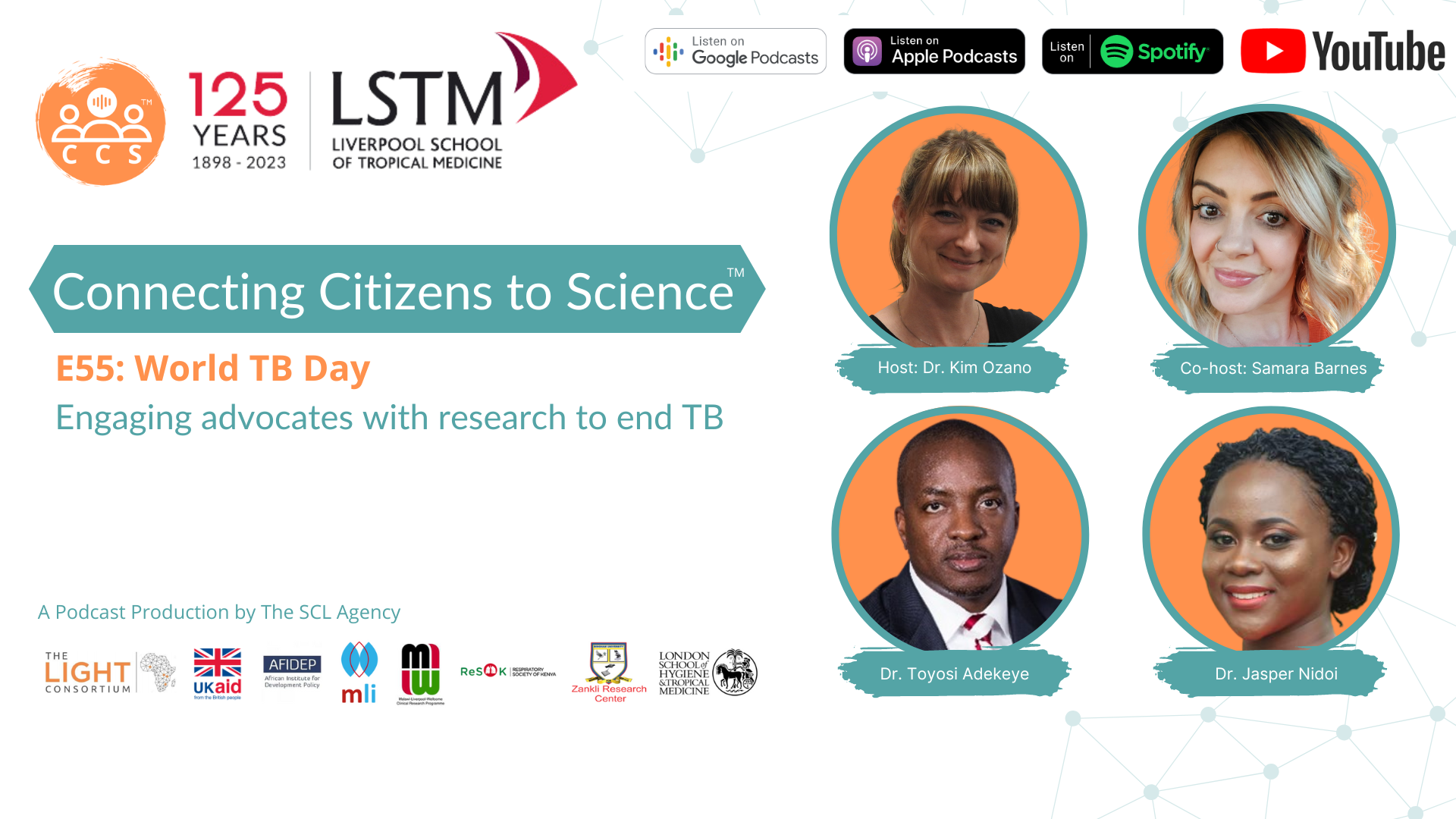
In this episode we are celebrating World TB Day, this year’s campaign is ‘YES! We Can End TB’ and is all about solidarity and collective action. It centres on the increased engagement of those affected by TB, communities and civil society that are leading the movement towards ending this disease.
This episode features the LIGHTconsortium which aims to provide new evidence on the effectiveness of different gender-sensitive pathways and approaches to health for those with TB in urban, HIV-prevalent settings across Uganda, Nigeria, Malawi and Kenya. Our co-host, Samara Barnes, who has lived experience of TB in the UK speaks with researchersToyosi Adekeyein Nigeria and Jasper Nidoiin Uganda from the LIGHT consortium about the ways they are engaging with affected communities in their work. Samara also shares her experience from the UK and the conversation reflects on the differences of TB across contexts.
This episode features:
Samara Barnes Affected Community Co-Lead at the UK Academics and Professionals to End TB (UKAPTB)
Samara is an Affected Community Co-Lead at the UK Academics and Professionals to End TB (UKAPTB) Samara Barnes was diagnosed with active pulmonary TB in late 2015 and it was discovered she was also drug resistant a little while into her treatment. Until that point, Samara knew little about the illness apart from the fact that her Grandad had died of TB many years previously. Samara has raised money for TB Alert and has been part of their peer supporter programme too. She has also studied and written papers on the Global disparities in TB treatment. It is important for Samara to raise awareness of this illness, be an advocate for reducing the stigma surrounding it and to encourage decision makers in the UK to ensure they keep to their commitment of a year on year reduction of TB and contribute to the WHO's commitment to eliminate TB by 2035. Samara works for a national children's charity and is also a borough and county councillor.
Dr Jasper Nidoi-Early Career Researcher, Liverpool School of Tropical Medicine, U.K and Makerere University Lung Institute, Uganda.
Jasper Nidoi is a Ugandan medical doctor with specialist training in health economics and health systems and policy research from Karolinska Institutet, Sweden.For over 5 years, she has been involved in the design and implementation of clinical trials that have evaluated drugs for the prevention and treatment of infectious diseases in Uganda. She is a health economist on a clinical trial that is evaluating the effectiveness and cost-effectiveness of standardized medication for MDR-TB. She was a co-investigator in a study that evaluated the impact of socio-economic factors on tuberculosis treatment outcomes in one of the poorest regions in Uganda. Her research interests are in the socio-economic determinants of health as they pertain to tuberculosis and the use of decision-analytic models to systematically synthesize data for the economic evaluation of healthcare interventions to guide policy that maximizes resource allocation in the presence of uncertainty.
Dr Jasper Nidoi joins the LIGHT Consortium as a researcher where she will contribute to generating evidence on gender-sensitive pathways and approaches for TB to increase the proportion of men in urban areas with TB who successfully complete screening and initiate treatment. She joins the team as a skilled health economist and health systems researcher.
Dr Toyosi Adekeye- Senior Lecturer Department of Community Medicine and primary Healthcare Bingham University and Research Uptake Manager, LIGHT Consortium Zankli Research Centre (ZRC) Nigeria
Dr.Adekeye is a Medical Doctor and Public Health expert who serves as a senior lecturer in the Department of Community Medicine and Primary Healthcare and the LIGHT consortium Research Uptake Manager, at the Zankli Research Centre (ZRC), Bingham University, New Karu, Nasarawa State where he manages and coordinates all research activities and inputs across the LIGHT consortium in Nigeria. He leads a team that strives to generate new evidence on options and approaches to maximize male access to healthcare services for TB in urban, HIV-prevalent settings. The evidence generated will inform better gender-sensitive and pro-poor policies that will enable better access to TB care.